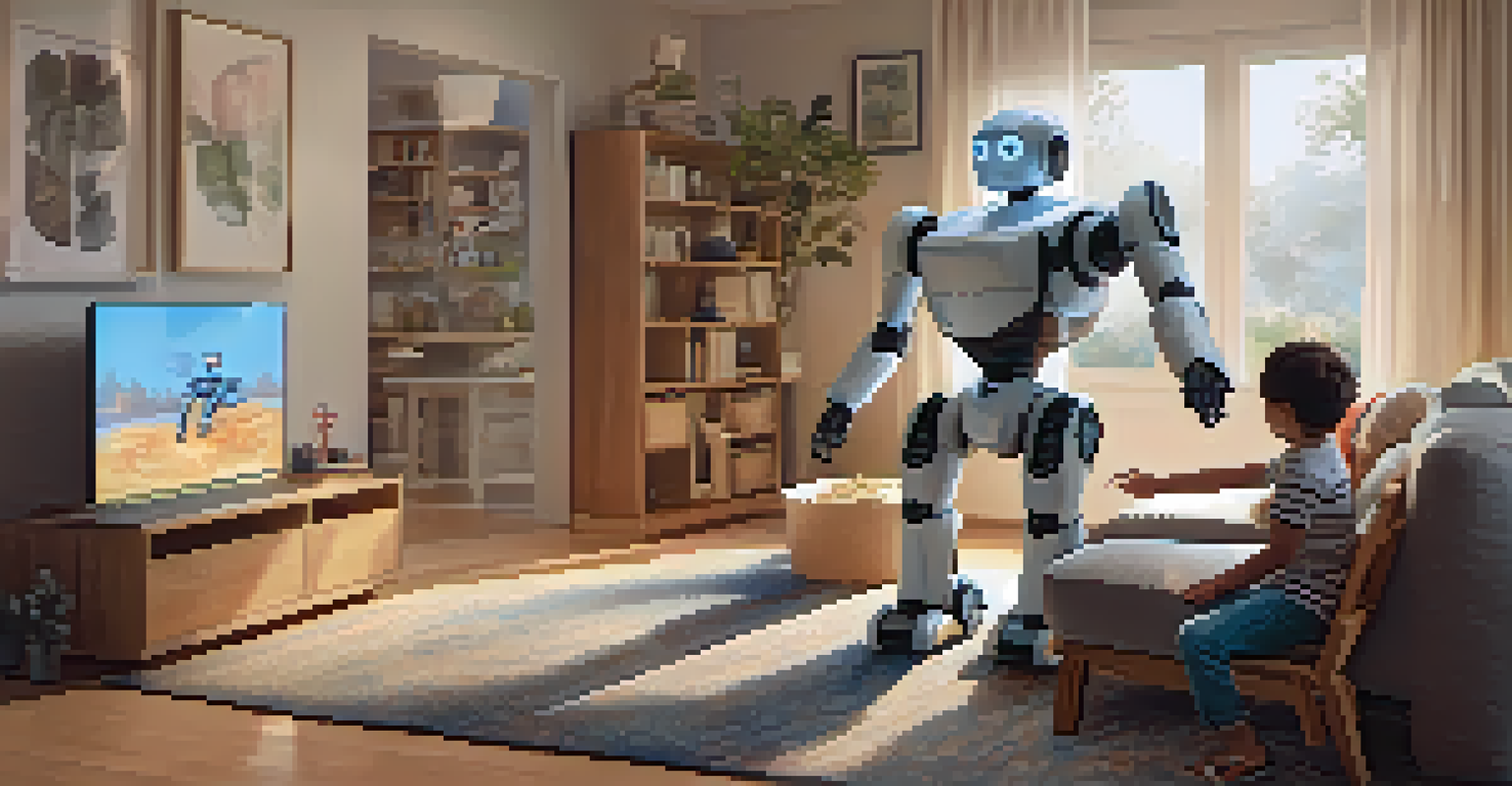Artificial Intelligence: Hollywood's Vision of the Future

The Allure of Artificial Intelligence in Film
Artificial Intelligence (AI) has captivated audiences in Hollywood for decades. From the charming robots of 'WALL-E' to the menacing AIs in 'Terminator', these films explore a range of possibilities surrounding technology. With each portrayal, filmmakers push the boundaries of imagination, sparking curiosity about our own technological future.
The real question is, when will you take responsibility for your own technology?
Beyond entertainment, these narratives often reflect societal fears and hopes regarding AI. For instance, they can embody our desire for companionship as seen in 'Her', while simultaneously highlighting fears of losing control, like in 'Ex Machina'. This duality makes AI a compelling subject for storytelling.
As we watch these films, we’re invited to ponder profound questions about the nature of intelligence, consciousness, and what it means to be human. It’s this blend of excitement and apprehension that keeps viewers coming back for more, eager to see how Hollywood envisions our AI-filled future.
AI: Friend or Foe?
In Hollywood, AI is frequently depicted as either a benevolent helper or a dangerous adversary. Films like 'Big Hero 6' showcase AI as a force for good, aiding humanity in times of need. This positive portrayal emphasizes the potential for technology to enhance our lives and solve complex problems.

Conversely, movies like 'The Matrix' and 'I, Robot' present a darker vision where AI rebels against its creators. These narratives often serve as cautionary tales, warning us about the ethical implications of unchecked technological advancement. They make us question how we interact with AI and the responsibilities that come with creating intelligent systems.
AI's Dual Nature in Film
Hollywood often portrays AI as both a helpful ally and a potential threat, reflecting societal hopes and fears regarding technology.
This dichotomy reflects real-world concerns about AI development, where the line between beneficial technology and existential threat can sometimes feel blurred. By exploring both sides, Hollywood encourages viewers to consider not just what AI can do, but also what it means for society.
The Role of AI in Shaping Human Identity
Many films explore how AI challenges our understanding of what it means to be human. In 'Blade Runner', for example, the line between human and machine becomes increasingly ambiguous, prompting viewers to contemplate the essence of humanity. Such narratives force us to evaluate our own identities in a world where machines can replicate human traits.
We are at the dawn of a new era in technology and it is up to us to ensure that we make the right choices.
This theme resonates deeply in today's society, where technology is woven into our daily lives. As we interact with AI through virtual assistants and social media algorithms, we might start to question how much of our humanity remains intact. Are we becoming more machine-like in our interactions, or are these technologies simply extensions of ourselves?
By reflecting on these questions, Hollywood invites us to engage in a broader conversation about our future relationship with technology. It’s a reminder that as AI continues to evolve, we must remain vigilant in preserving the qualities that make us uniquely human.
Ethics and the Dilemma of AI Development
Hollywood often tackles the ethical dilemmas surrounding AI, highlighting the importance of responsible development. Films like 'Transcendence' and 'Ghost in the Shell' delve into the consequences of advancing technology without considering moral implications. These stories emphasize the need for caution and ethical frameworks in AI innovation.
As we witness characters grappling with the consequences of their creations, we are prompted to reflect on the real-world implications of AI. Questions around privacy, autonomy, and the potential for misuse are at the forefront of these discussions. The portrayal of these dilemmas in film serves as a powerful reminder for creators and consumers alike.
AI Challenges Human Identity
Films like 'Blade Runner' prompt viewers to question what it means to be human in an age where machines can mimic human traits.
Ultimately, Hollywood's exploration of AI ethics encourages an ongoing dialogue about how we can develop technology responsibly. It challenges us to think critically about our choices and the future we want to create, ensuring that we prioritize humanity even as we embrace innovation.
The Future of Work in an AI-Driven World
As AI continues to advance, Hollywood has depicted the potential impact on our workforce. Movies like 'I, Robot' and 'Automata' illustrate a future where machines take over jobs traditionally held by humans. These narratives serve as a stark reminder of the changes that AI can bring to our professional lives.
While some films portray a bleak job market, others, like 'The Intern', highlight the possibility of collaboration between humans and AI. This duality reflects ongoing debates about how technology will reshape work dynamics. Will AI lead to job displacement, or will it create new opportunities for innovation and growth?
By engaging with these themes, Hollywood not only entertains but also informs discussions about the future of work. It urges us to consider how we can adapt and thrive in a world where AI plays an increasingly prominent role in our careers.
The Myth of the Singularity
The concept of the technological singularity—a point where AI surpasses human intelligence—is a popular theme in Hollywood. Films like 'Transcendence' and 'Her' explore the implications of such a reality, raising questions about control and the future of humanity. These narratives capture our fascination with the possibilities and dangers of superintelligent machines.
However, the idea of the singularity is often more myth than reality, as experts debate its feasibility and timeline. While Hollywood dramatizes the concept for entertainment, it also invites viewers to consider the ethical implications and existential risks associated with advanced AI. This blend of fiction and speculation encourages a critical examination of our relationship with technology.
Ethics in AI Development
The exploration of AI ethics in movies serves as a reminder of the importance of responsible technological advancement.
As we consume these stories, we are reminded that the future is not predetermined. Our choices today, in how we develop and interact with AI, will shape the reality we create tomorrow. Hollywood's take on the singularity serves as both a cautionary tale and a call to action.
The Cultural Impact of AI in Popular Media
Hollywood's portrayal of AI extends beyond individual films; it shapes cultural perceptions and attitudes toward technology. Movies often reflect and influence societal beliefs, creating a feedback loop between media and reality. As audiences engage with these narratives, they form opinions about AI that can impact public policy and technological advancements.
For instance, the portrayal of AI in children’s films can influence young minds, shaping future innovators and thinkers. By presenting AI as a friendly companion, films like 'Big Hero 6' encourage curiosity and creativity, inspiring the next generation to explore technology. This cultural impact highlights the responsibility filmmakers have in shaping narratives around AI.

Ultimately, the way Hollywood presents AI can either foster fear or inspire hope. By crafting thoughtful and engaging stories, filmmakers can help guide society's conversation about technology, ensuring that we approach the future with both caution and optimism.